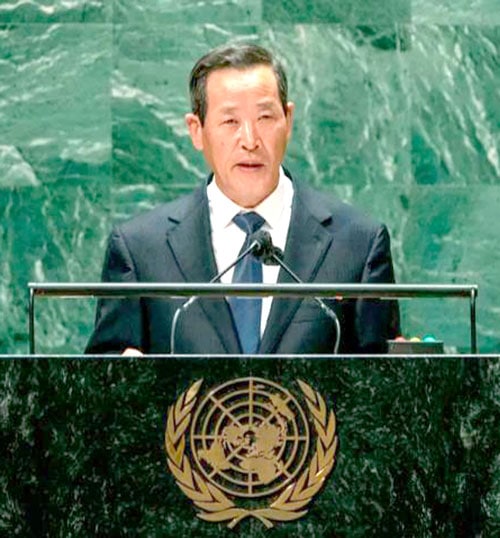Seoul, South Korea
North Korea on Monday accused the United States of keeping up its “hostile policy” and demanded the Biden administration permanently end joint military exercises with South Korea even as it continued its recent streak of weapons tests apparently aimed at pressuring Washington and Seoul over slow nuclear diplomacy.
North Korean Ambassador Kim Song’s comments on the last day of the U.N. General Assembly’s annual high-level meeting came shortly after South Korea’s military reported a North Korean firing into eastern waters.
The North’s latest test, which followed two previous rounds of missile tests this month, indicated the country is returning to its tried-and-true technique of mixing weapons demonstrations and peace offers to wrest concessions amid long-stalled negotiations over its nuclear weapons program.
North Korea’s neighbors said the weapon fired early Tuesday local time was a short-range missile and further details about the launch were being analyzed.
Speaking through a translator, Kim justified North Korea’s development of a “war deterrent” as a necessity to defend against U.S. threats, and also accused South Korea of betraying inter-Korean peace agreements by prioritizing its Western ally over “national harmony.”
He demanded that the United States “permanently” stop its military exercises with South Korea, which the North has traditionally described as invasion rehearsals, and end the deployment of U.S. strategic weapons if it wants to end the 1950-53 Korean War and “is really desirous of peace and reconciliation on the Korean Peninsula.”
“The possible outbreak of a new war on the Korean Peninsula is contained not because of the U.S.’s mercy on the DPRK, it is because our state is growing a reliable deterrent that can control the hostile forces in an attempted military invasion,” Kim said, referring to North Korea by the abbreviation of its formal name, the Democratic People’s Republic of Korea.
The Biden administration recently announced that it terminated the longest war in Afghanistan after 20 years, Kim said, “but the U.S. is still ignoring the reality that the Korean War has not ended for over 70 years.”
Kim cited “military threats and hostile acts” that the DPRK has faced from the U.S. every day since it was founded in 1948.
North Korea mainly uses the term “hostile policy” to refer to U.S.-led sanctions over its nuclear weapons program and the joint U.S.-South Korea military drills.
“If (the United States) is really desirous of peace and reconciliation on the Korean Peninsula, they should take the first step towards giving up its hostile policy against the DPRK by stopping permanently the joint military exercises and the deployment of all kinds of strategic weapons which are leveled at the DPRK in and around the Korean Peninsula,” Kim said.
The United States keeps about 28,000 troops in South Korea to help deter potential aggression from North Korea.
The allies say their drills are defensive in nature, but they have canceled or downsized them in recent years to create space for diplomacy or in pandemic response.
North Korea’s nuclear program has seemed to recede in attention at this year’s General Assembly in the face of new and broader challenges like COVID-19 and rising U.S.-China tensions, and the meeting ended without meaningful new proposals to break the diplomatic stalemate.
But North Korea usually hates being ignored. After months of relative quiet, the country this month tested new cruise missiles it eventually plans to arm with nuclear warheads and launched ballistic missiles from a train.
It then offered to improve relations with South Korea if certain conditions are met.
Analysts say North Korean leader Kim Jong Un is using the South’s desire for inter-Korean engagement to pressure Seoul to extract concessions from the Biden administration on his behalf as he renews an attempt to leverage his nuclear weapons for badly needed economic and security benefits.
In their speeches at the General Assembly last week, both President Joe Biden and South Korean President Moon Jae-in expressed hopes to diplomatically resolve the standoff with North Korea while sidestepping the fresh tensions created by the North’s latest tests.
Biden, whose pullout from Afghanistan underscored a broader shift in U.S. focus from counterterrorism and so-called rogue states like North Korea and Iran to confronting a rising authoritarian superpower in China, said his administration would seek “serious and sustained diplomacy” to denuclearize the Korean Peninsula.
Moon, who wants North Korea to remain a priority in Washington, made a more ambitious push to break the diplomatic deadlock, calling for the leaders of the Koreas, the United States and China to declare an end to the Korean War.
The conflict, in which North Korea and ally China faced off against South Korea and U.S.-led U.N. forces, ended with an armistice, but there was never a peace treaty.
North Korea rebuffed Moon’s offer last week, saying such a declaration would end up being a “smokescreen” to cover up U.S. hostility.
But Kim Yo Jong, the influential sister of the North Korean leader, said her country will take steps to repair ties with the South, and may even discuss another summit between their leaders — if Seoul drops its hostility and public criticism about North Korean military developments.
Nuclear negotiations have stalled since the collapse of a meeting between Kim Jong Un and former President Donald Trump in February 2019, when the Americans rejected the North’s demands for a major removal of U.S.-led sanctions over its nuclear weapons program in exchange for dismantling an aging nuclear facility.
Kim Jong Un in recent political speeches has vowed to bolster his nuclear deterrent in face of U.S. pressure. His government has so far rejected the Biden administration’s offer to resume talks without preconditions, saying that Washington must abandon its hostile policy first.
In Monday’s address, ambassador Kim said, “I am convinced that a good prospect will be opened or the DPRK-US relations and the inter-Korean relations if the U.S. refrains from threatening the DPRK and gives up its hostility towards it.”—AP










